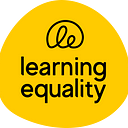Mobile Learning Week 2017: Mapping Needs for Educational Platforms in Crisis
Learning Equality’s first time at Mobile Learning Week in Paris may have debatably been fueled by unhealthy amounts of croissants and fromage, but was certainly a productive and informative week.
Co-hosted by UNESCO and UNHCR, this year’s conference focused on education in emergencies and crises. Our first generation platform, KA Lite is being utilized in emergency contexts in part because it is lightweight and can provide Khan Academy content offline. With refugee education being one of the primary anticipated use cases for our next generation platform Kolibri, we were ready to explore how mobile learning can offer new solutions for learners, teachers, and policy-makers working in these emergency and crisis settings.

Throughout the week, we expanded our knowledge about the use of mobile technology in these contexts by attending a workshop on how to explore scale, hearing examples of the education response to natural disasters and conflicts from practitioners, exploring the winning smartphone game apps for literacy acquisition in Arabic as part of the EduApp4Syria competition, and meeting with previous and potential future collaborators. We were also excited about the buzz about our own work, including our support from Google.org and our Instant Schools collaboration with Vodafone Foundation.
Identifying Needs to Strategize
Learning Equality was honored to contribute to this broader discussion by co-convening a Strategy Lab session with UNHCR, UNICEF Office of Innovation and Google.org focused on developing a common vision for education platforms that best serve low-resource, marginalized and displaced communities. This session strived to unite stakeholders, outline platform criteria and parameters, and generate a shared work plan for moving forward (Sneak peek: The co-conveners developed a report synthesizing the feedback from the lab).
The discussion kicked off with an examination of the various challenges in developing and delivering quality education in crisis, principles for designing in these contexts, and an overview of Kolibri as a potential platform that could address users’ needs.
The lab activity was straightforward but set the bar high: identify the needs of different users in refugee contexts, explore their experience in identifying and using an educational platform, and develop a want-ad to express the needs of a user in a manner that distinguished “needs” from “wants.” To do this, participants divided into groups based on thematic areas with a focus on certification and alignment with host countries; curriculum alignment; deployment models, infrastructure, and training; learners (with a focus on learner and content needs); open content providers; and teacher/educators.

What ensued was a fast-paced, active conversation to identify the needs of different types of users and stakeholders for educational platforms in refugee contexts, specifically learners, teachers, Ministry of Education, education partners (including NGOs) and content providers. By the end of the session, participants identified various needs for an educational platform, ranging from curricular alignment of quality content to interoperability standards to acquiring and cultivating relevant skills.

What we took away from this
The needs identified during the session were incredibly insightful for the Learning Equality team. While they aligned with the overall Kolibri roadmap, the dialogue also reinforced the clear need for educational platforms in emergency contexts. Having reflected on the session, four takeaways are significant:
- Collaboration is a must during crisis: The need for multi-stakeholder partnerships and using the expertise of like-minded organizations working towards the same goal is a continuous topic of discussion in the education development space, and the energy in this room was definitively focused around the idea of creating an ecosystem. Being in a room with representatives from organizations that have products that complement each other and whose missions are aligned on mission was one of the more inspiring aspects of the conversation.
- Time is a double-edged sword: Given that more than half of refugee children are not in school, and the average time a refugee spends in a camp is 17 years, there is urgency to develop educational solutions that can work in this context and apply at scale. Yet time was limited for this session, and there was not space in the discussion for some critical aspects of educational platforms, including the need for data measurement to assess impact related to educational outcomes, and the technical aspects of what is needed in a ‘basic box’ for such a platform.
- Roadblocks exist to accessing educational platforms: The session also served as a reminder of the critical needs that exist outside the platform and may limit access to educational platforms, including the need for safe spaces for learning, hardware maintenance and technical support, and power sources. While Learning Equality cannot address this unilaterally in implementing Kolibri, it will identify different ways to work with partners to address the various secondary needs of users for educational platforms.
- Understand limitations and adjust accordingly: Given that we were working in a conference room far removed from the users in emergency context that would use this platform, it is still quite clear that there is a need for similar workshops and user testing on the Kolibri platform in-context with the actual learners, teachers and other stakeholders to ensure their needs are actually being addressed. In spite of these limitations, there was still value in going through the exercise.
The conversation didn’t end in Paris, and as we continue to reflect on the lessons of our session to inform specific feature needs for Kolibri in this context, we encourage individuals and organizations interested in providing input on this work to be in touch.
Until next year, mes amies!

